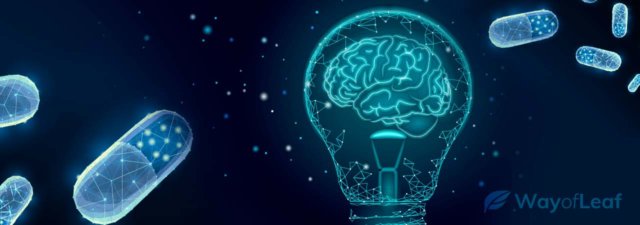Modafinil is a drug that helps improve wakefulness. Commonly sold under the brand name Provigil, doctors prescribe it to help treat various sleep disorders.
Modafinil has cognitive-enhancing properties meaning people use it as a nootropic – a chemical that can increase brain function. It is popular among university students who use it to help study for exams and focus on coursework and essays for long periods.
What Is Modafinil?
Modafinil is a central nervous system stimulant. It activates the sympathetic nervous system, the part of the nervous system that prepares the body for action by increasing alertness and heart rate.

Researchers have found modafinil increases the concentration of certain chemicals in the brain. These include dopamine and norepinephrine. Effects of dopamine include improving focus and mood, and effects of norepinephrine include activating the sympathetic nervous system.
Research has also shown modafinil can decrease the amount of GABA in the brain. As GABA is a chemical involved in inducing sleep – this biological effect may explain why modafinil improves wakefulness.
Modafinil Uses
Sleep disorders:
By promoting wakefulness, modafinil counters the effects of tiredness and other problems related to sleep deprivation. The Food and Drug Administration (FDA) has approved modafinil as a medication for sleep-based disorders to be prescribed by doctors, including:
- Chronic fatigue syndrome – extreme ongoing tiredness
- Sleep apnea – interrupted breathing during sleep
- Narcolepsy – falling asleep at inappropriate times during the day
- Insomnia and excessive sleepiness for people who work shifts that overlap with usual sleep hours
ADHD
In some instances, doctors have prescribed modafinil for patients with ADHD as an unofficial “off-label” treatment. The FDA does not currently approve modafinil as an ADHD medication. However, research suggests modafinil could have benefits for ADHD patients. For example, one analysis study showed that modafinil significantly improved ADHD compared to a placebo in adolescents at home and school across 927 study participants.
Depression
A common symptom of major depressive disorder (MDD) and bipolar depression (BD) is fatigue. As such, medical researchers have investigated the effects of combining antidepressant medication alongside modafinil to help reduce fatigue in these conditions.
Research suggests that combining modafinil with antidepressants reduces measures of fatigue in patients with major depressive disorder.
One study showed that combining modafinil with antidepressants was more effective in reducing depressive symptoms in BD patients than antidepressants alone.
Another study showed that combining modafinil with antidepressants reduced measures of fatigue in patients with MDD. However, two of the patients taking modafinil during the experiment experienced increased feelings of suicidal ideation.
Schizophrenia
Fatigue is also a common negative symptom of schizophrenia. Research has shown modafinil could help improve fatigue in schizophrenic patients. Evidence suggests it could also help improve cognitive function in patients, although this is limited.
One study showed modafinil increased psychosis in a select number of schizophrenic patients. So although modafinil may be able to alleviate some symptoms of schizophrenia, it could potentially worsen others.
Modafinil Effects
Modafinil short-term effects
People commonly take modafinil for mental effects, which include:
- Increased energy
- Increased alertness
- Improved ability to focus
- Improvements in memory
- Increased motivation
Physical effects of modafinil are related to sympathetic nervous system activation. These effects include:
- Increased heart rate
- Increase blood pressure
- Decreased appetite
Modafinil long-term effects
The long-term consequences of using modafinil are unclear. One study investigated the long-term effects on over sixty narcolepsy patients using modafinil and showed no significant changes in heart function, mood, weight, or nighttime sleep. However, the study only looked at the effects for six weeks, so it doesn’t account for any consequences that may take longer to develop.
As modafinil acts on the dopamine system, reduced activity in the prefrontal cortex could be a long-term side effect.
Evidence shows that long-term regular use of stimulant drugs that act on the dopamine system can lead to reduced activity in the prefrontal cortex, the area of the brain most associated with higher cognition. As modafinil acts on the dopamine system, reduced activity in the prefrontal cortex could be a long-term side effect.
Furthermore, researchers have suggested that long-term use of nootropics, including modafinil, could lead to impairments in neuroplasticity, a biological process associated with learning and memory. The same group of researchers also suggested nootropics could cause long-term damage to the body’s natural sleep-wake cycles.
Modafinil Dosage
Adults with narcolepsy are recommended to take 200mg of modafinil a day, split between 100mg in the morning and 100mg at noon.

To date, the maximum modafinil dosage, known as the LD50, has never been reached. In one case study, the largest reported dose of 5000mg did not cause death. However, the person who took the dose reported:
- Severe headache
- Nausea
- Abnormal heartbeat (tachycardia)
Modafinil Side-effects
The physical side effects of modafinil are mainly related to its stimulating role in the body. These side effects include:
- Difficulty sleeping
- Dehydration
- Decreased appetite
- Headache
- Nausea
- Tachycardia
In rare cases, some people have developed severe skin conditions following modafinil, including Stevens-Johnson syndrome (SJS) and toxic epidermal necrolysis (TEN).
Mental side effects of modafinil can include:
- Agitation
- Anxiety
- Increased paranoia
Cases of stimulants triggering psychosis and increasing pre-existing psychotic symptoms mean people with a family history of psychiatric illness should be cautious when taking modafinil.
Modafinil Interactions
Modafinil has been demonstrated to interact with certain enzymes, which affects the breakdown process of other drugs. Modafinil drug interactions may decrease the effectiveness of these drugs or cause adverse reactions.
Known modafinil drug interactions include:
- Ethinylestradiol – used commonly in birth control pills. This interaction means modafinil can make hormonal contraceptives less effective than usual
- Diazepam – also known as valium, used for anxiety disorders
- Phenytoin – an epilepsy medication
- Cyclosporin – used as an immunosuppressant for treating arthritis, Crohn’s disease, and preventing rejection in organ transplants
- Triazolam – used to treat insomnia
Bottom Line on Modafinil
If you suffer from a sleep disorder or another condition in which you experience fatigue or difficulty concentrating – you may be interested in speaking to your doctor about receiving a prescription for modafinil. If so, be sure to talk with your doctor about any safety concerns, including side effects and drug interactions.
Although there is some information about modafinil risks, the evidence on long-term health risks is still limited, meaning side effects from long-term chronic use may still be unknown.
Because of its unclear safety profile, it’s recommended to only use modafinil when necessary.














